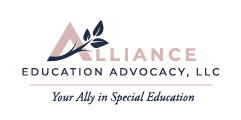As a Special Education attorney and advocate, I spend a lot of time talking about Individualized Education Plans, Least Restrictive Environment, and interventions for children with learning disabilities. But what happens when students head off to college or university? Will they still have their IEP? Are they still entitled to accommodations? The transition to college is a challenging time, especially for students with disabilities. Today is Part 1 in a series of blog posts that focus on how students with disabilities can thrive and succeed in college.
Laws Protecting Students With Disabilities
There are several federal and state laws that protect persons with disabilities. In the context of special education, the big three are the Individuals with Disabilities Education Act (IDEA), The Rehabilitation Act, specifically Section 504, and the Americans with Disabilities Act (ADA).
Individuals with Disabilities Education Act (IDEA)
If your child has an IEP, you probably know what the IDEA is. The Individuals with Disabilities Education Act is the federal law that provides for special education and related services for children with disabilities. It creates an affirmative duty on public schools to identify children with disabilities and guarantees them a Free Appropriate Public Education through an Individualized Education Plan or IEP. This is the federal law most people familiar with when it comes to special education. Special education services guaranteed by the IDEA terminate upon graduation from high school with a regular high school diploma or at age 21. If your state law does not provide for public education for non-disabled students ages 18 to 21, states are not required to provide special education services for students with disabilities after age 18. In short, when your high school student graduates, he will lose his IEP. There is no legal requirement for college institutions to provide a free appropriate education to students with disabilities. So what laws protect college students with disabilities?
Rehabilitation Act, Section 504 and Americans With Disabilities Act (ADA)
Section 504 of the Rehabilitation Act and the Americans with Disabilities Act are the primary laws that protect students with disabilities. They also protect workers with disabilities in the workplace. They guarantee equal access and prohibit discriminatory practices. Section 504 Prohibits discrimination against persons with disabilities, and it applies to public and private schools that receive federal funding. It also applies to employers that receive federal funding.
The ADA Prohibits discrimination against persons with disabilities and applies to public and private schools, testing entities, employers, and state and local governments, regardless of federal funding.
So what qualifies as a “disability” under the Rehabilitation Act and the ADA? A disability is an impairment that substantially limits a major life activity, such as learning. Generally, persons with learning disabilities are considered to have impairment that substantially limits learning. The existence of a disability is judged on the basis of how the person actually functions, taking into account the positive and negative effects of compensatory strategies and medication. For example, Jessica has ADHD for which she takes medication. With medication she functions relatively normally in school and daily life. Thus, if her functioning with medication and/or compensatory strategies (like keeping a task or reminder list) does not substantially limit a major life activity, Jessica will not be considered to have a disability.
What Accommodations Are Available to College Students?
Accommodations are assessed on two factors: Necessity and Reasonableness. An accommodation is necessary if there is a nexus between the requested accommodation and the functional limitations associated with the disability. For example, a student with ADHD requests use of a calculator on tests because she has a slower processing speed than other students. Her request may be denied because the use of a calculator does not specifically address her slower processing speed. In this case, the accommodation for extended time more appropriately addresses her disability.
Accommodations must also be reasonable. An accommodation is not reasonable if it is too expensive or if it would replace the very skills and knowledge students must independently demonstrate. For example, a student would not be permitted to use a calculator on a test assessing basic calculation skills, but he may be able to use it in a higher-level math class that is not testing calculation skills.
Moreover, students must be qualified to do the college program in order to be protected under the law. They may be required to prove they are qualified. This is different from public elementary and secondary schools, where students are presumed to be qualified to be educated. Consider this example: Katie has dyslexia and ADHD with memory retrieval problems. She received special education in high school and had extra time on the SATs. In college she enrolls in the British Literature program and she receives similar accommodations to those she received in high school, including extra time on tests. Even with those accommodations, she fails her written exams and is dismissed from the program. If she claims she shouldn’t be dismissed from the program because her disabilities prevent her from taking tests on complex material, she probably won’t prevail. As long as the school provided her with all her requested accommodations and didn’t do anything improper, a court would likely find that Katie was simply not qualified for the program.
Common Accommodations
Course Accommodations include textbooks on tape, allowance of guide dogs on campus, use of a calculator, tape recorder, note taker, priority seating, a reader (who will read books or assignments to the student). Exam Accommodations may include Extended Time on Tests, a Reader (someone who will read exam questions aloud), a quiet room for testing, large print on paper test questions, answer test questions orally.
Generally speaking, colleges will provide accommodations but will not modify curriculum requirements. Remember we talked earlier about students needing to be qualified for their programs. Modifications are alterations to assignments that change the overall task (e.g., writing a two-page report instead of a five-page report). Accommodations are tools to help compensate for disabilities but do not change the the curriculum (e.g., books on tape, extra time for assignments or exams, or priority seating in class). Accommodations may not result in unfair advantage, require significant alteration to the program or course, result in lowering academic or technical standards, or cause the college to incur undue financial hardship.
Stay tuned for Part 2 of our series, where we will discuss how to work with your college or university to obtain accommodations and the specific steps you need to take.
Never miss a blog post. Sign up for the Newsletter!

